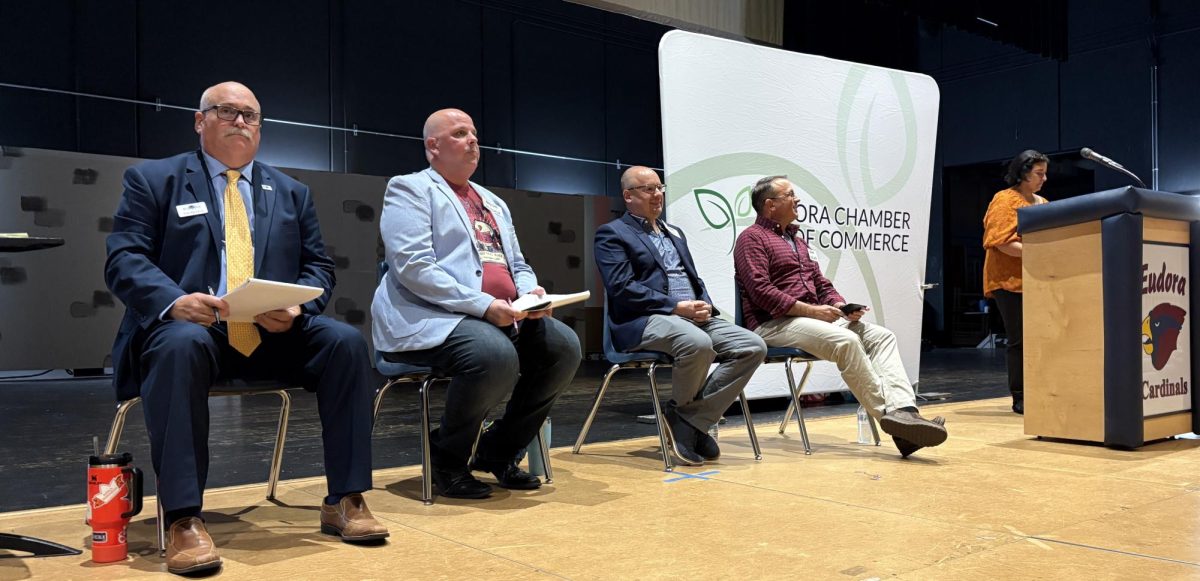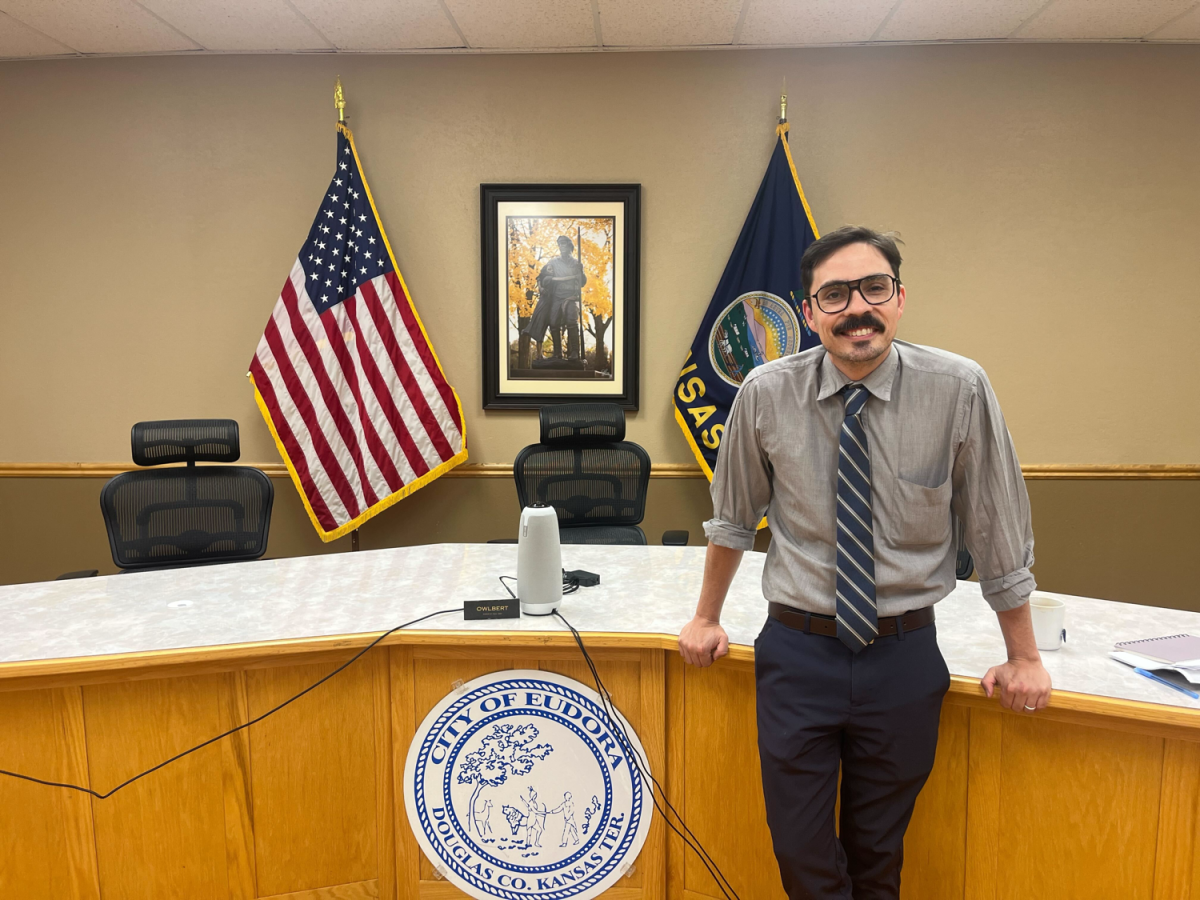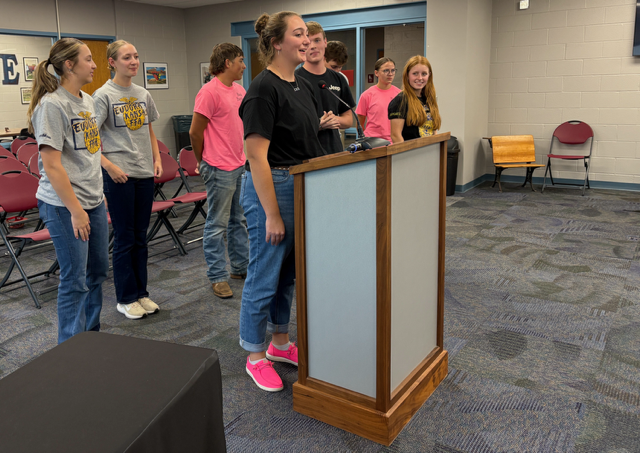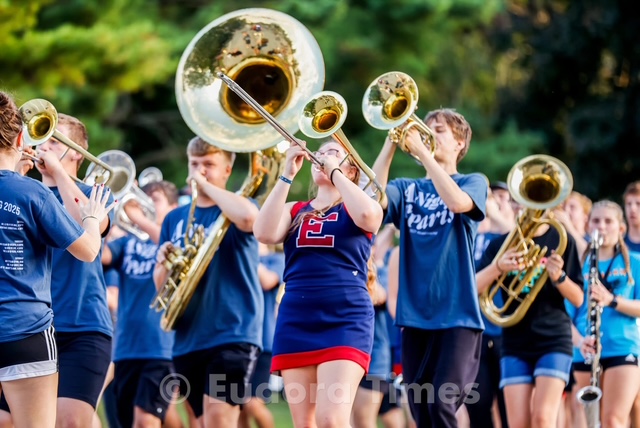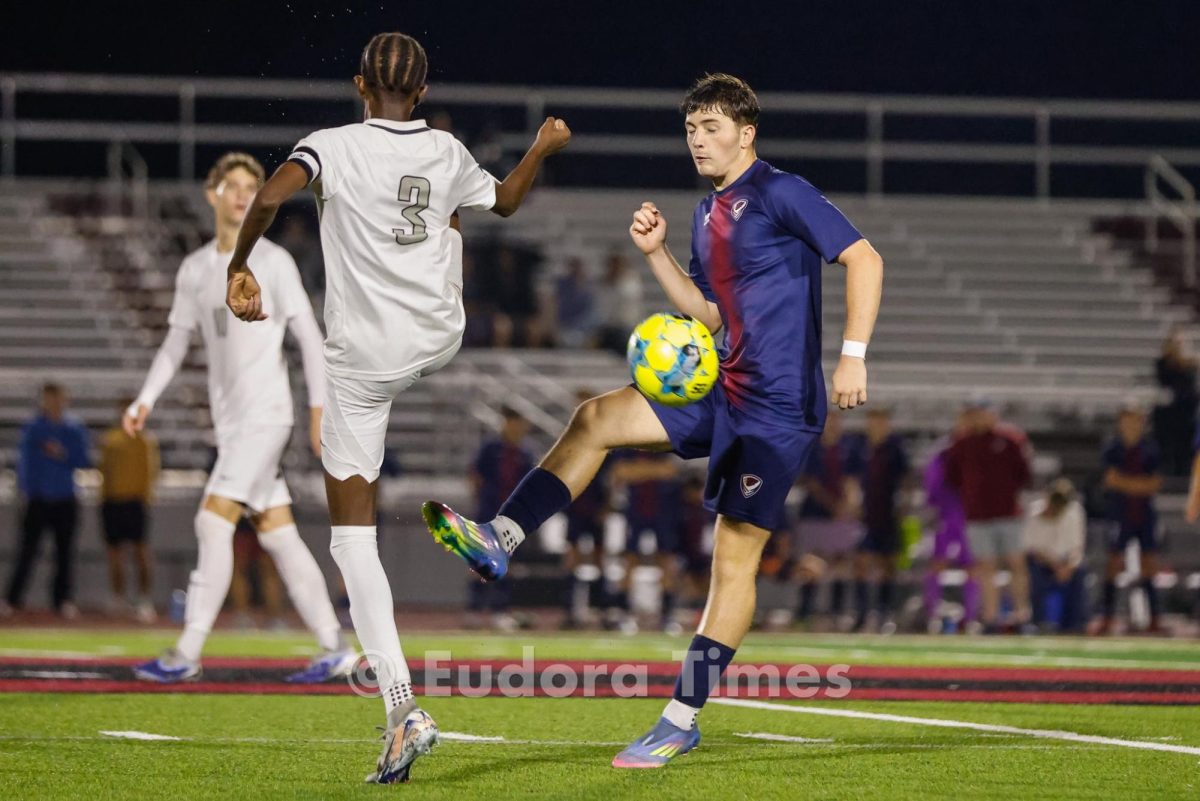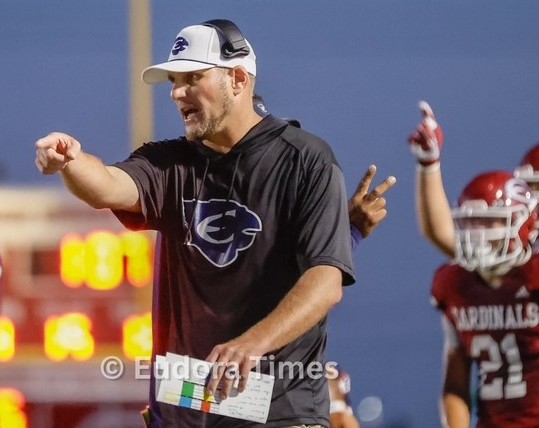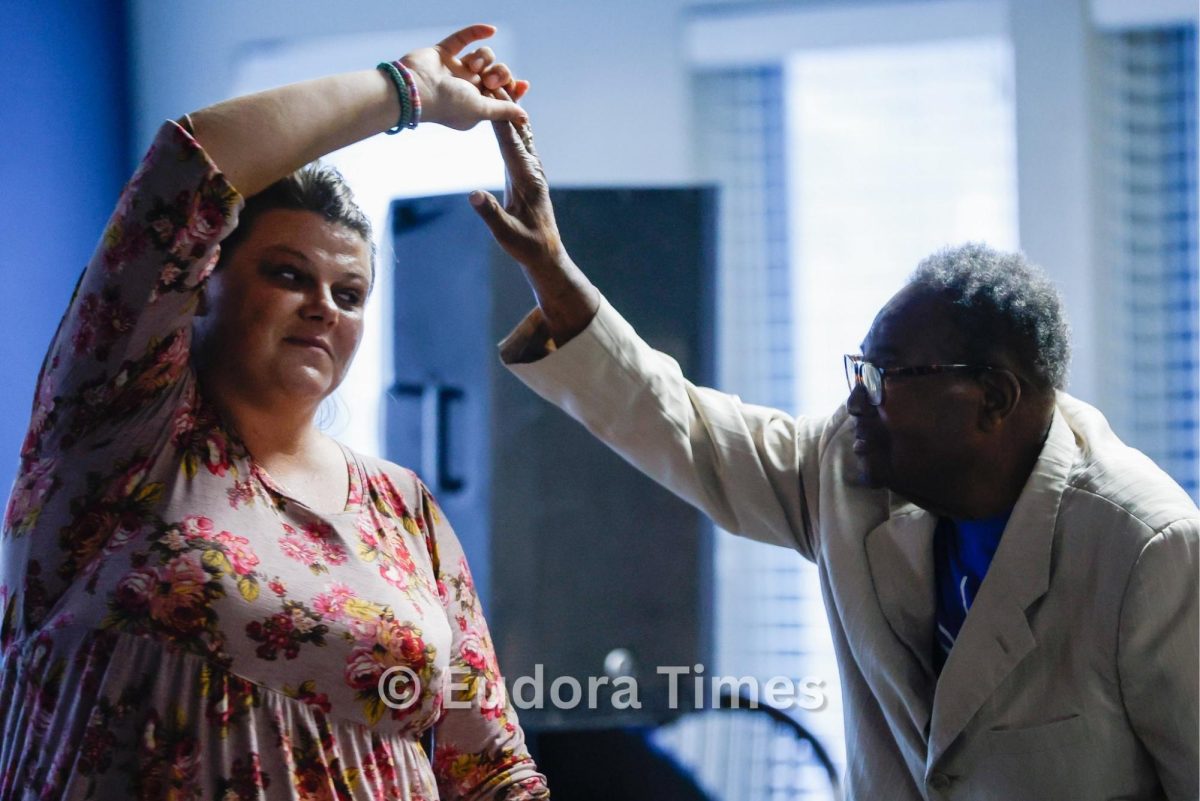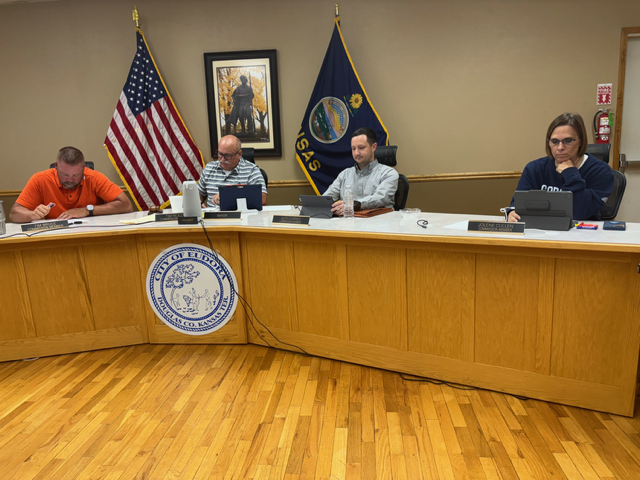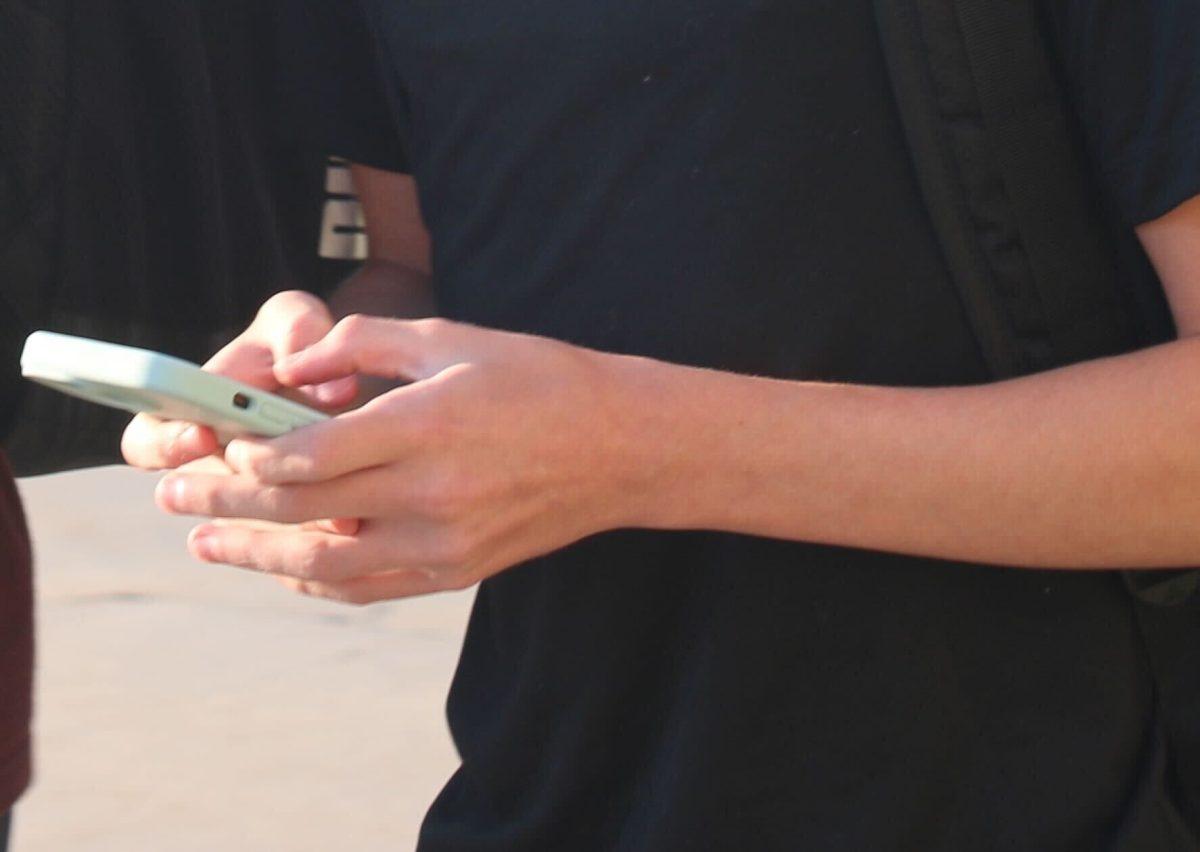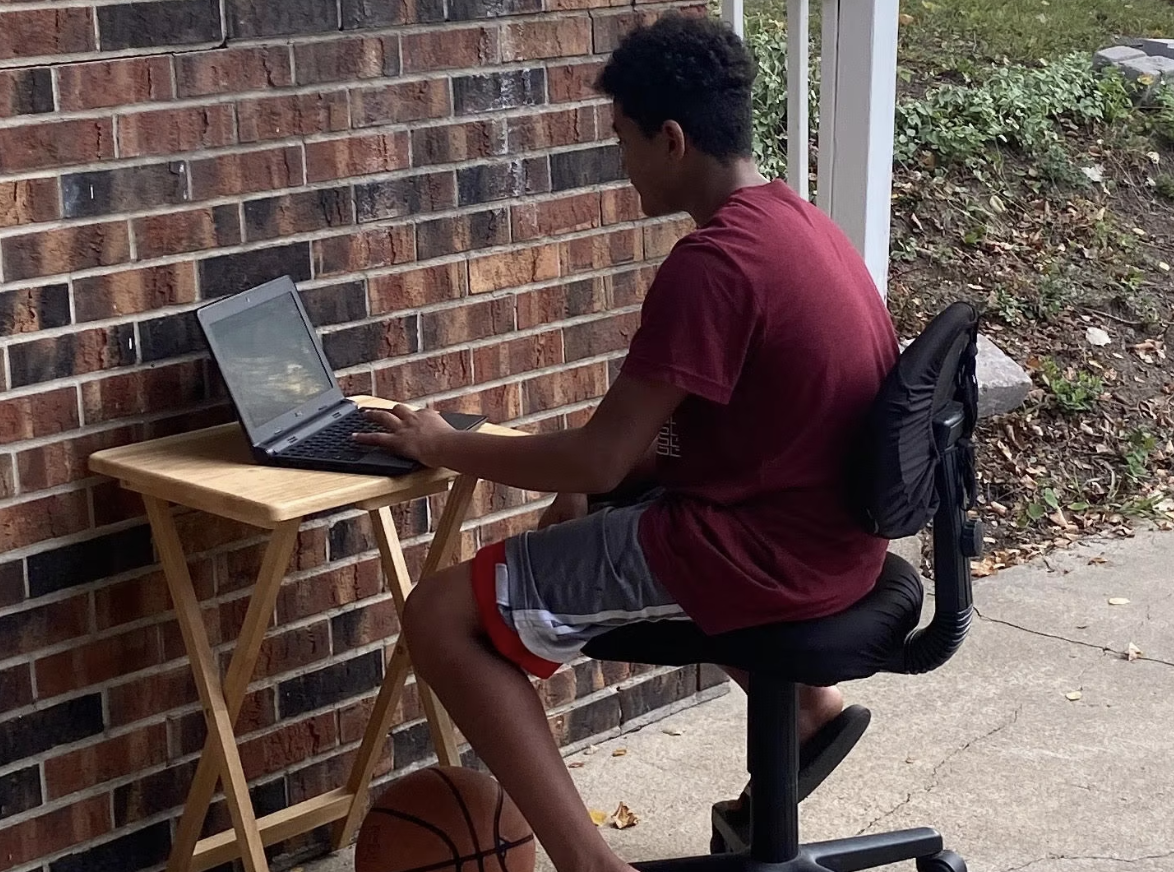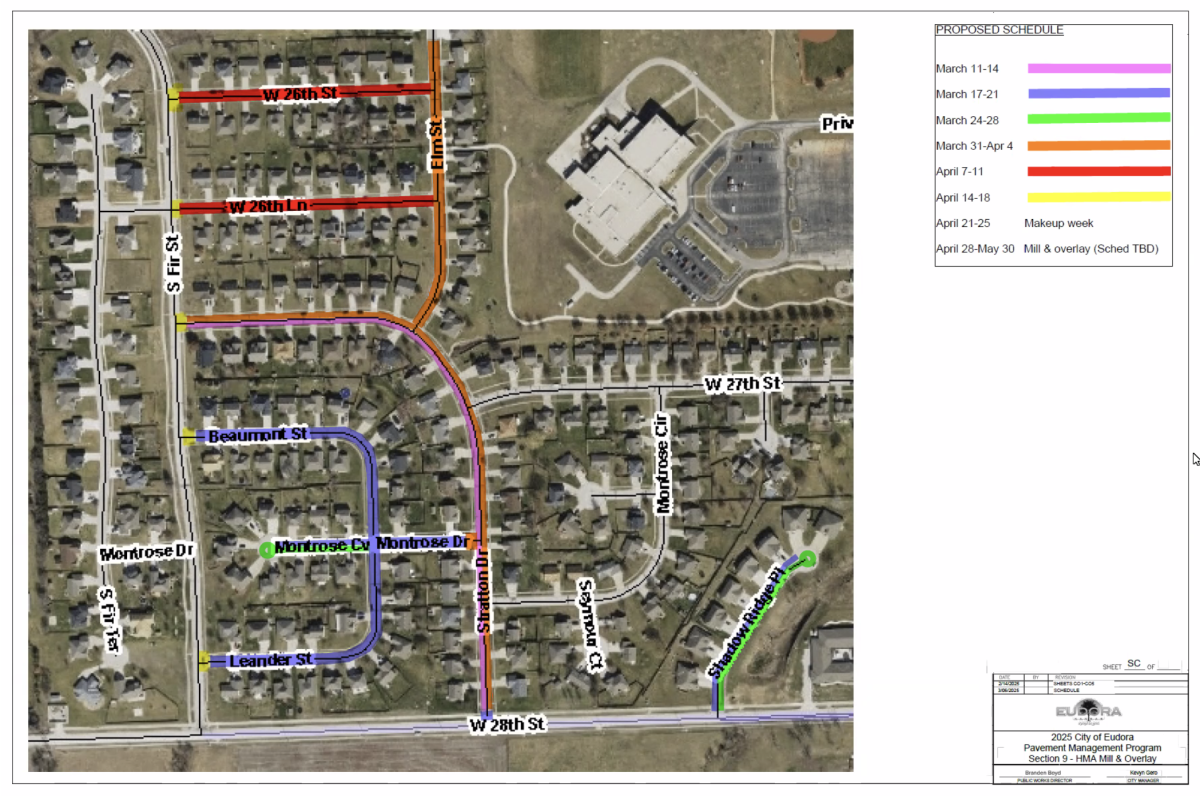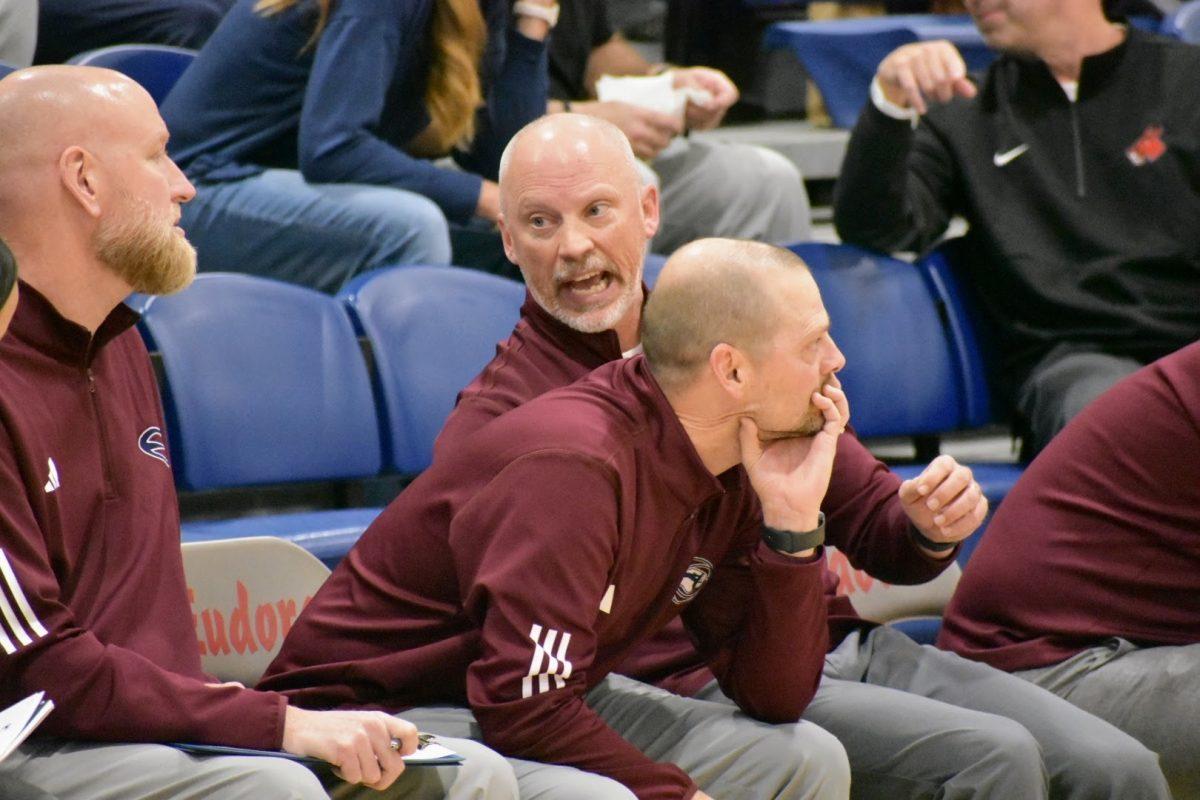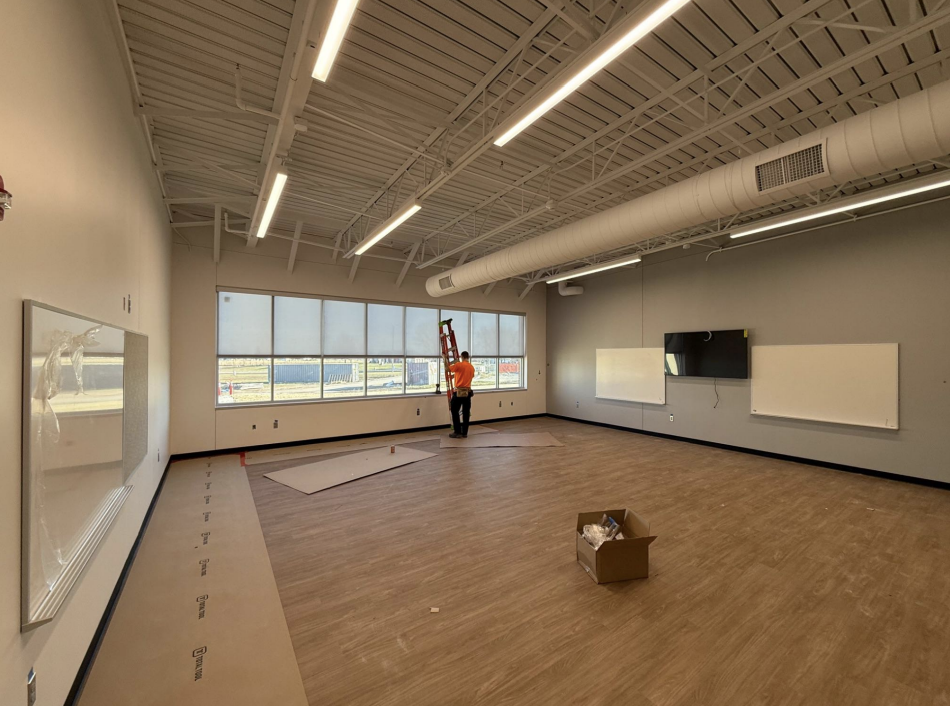If you are reading this story, you support community journalism. We need donations to serve this community and stay in business. Please go to this link to donate to support Sara, Ryn, Cuyler and Annalynn.
As national debates about the role of cellphones in schools have increased over the summer, senior Abby Adams thinks it would be extreme to have a total ban in Eudora.
“I could understand teachers being strict on it in the classroom and being like, ‘It needs to be put in your backpack during class.’ But I think you should still be able to have it out during the passing period or if you have free time,” Adams said.
Adams said cellphones can be a distraction for some students, but it’s more common for students to be respectful of their teacher’s rules.
“For the most part, we stay off of it when we need to,” she said.
Although Eudora has no plans to implement a ban on cellphones at the high school, other schools around the nation and in the region are trying to get students’ cellphone use under control.
As of the 2021-2022 school year, 76% of public schools prohibit non-academic cellphone use, according to the National Center for Education Statistics.
New York City, the nation’s largest school district, announced this summer its plans to ban cellphone use during the school day to keep students focused on learning and in-person interactions.
Florida and Indiana have also begun banning cellphones in classrooms in the last year. Other states like Vermont and Oklahoma have considered legislation on the matter.
In Kansas, the Olathe, Blue Valley and Gardner-Edgerton school districts all have new cellphone policies this school year.
Parents in Lawrence are also petitioning for the school board to put a ban on cellphones in schools.
Local administrators, school board members, students and state officials explain their views on cellphones in the classroom.
Views from local administrators
Superintendent Stu Moeckel said there’s no plan to fully prohibit cellphones or personal technology devices across the district any time soon.
“A blanket policy on things like that really puts a burden on both administrators and our teachers to enforce,” Moeckel said.
Personal technology devices include items like smart watches, tablets, laptops, headphones and gaming devices.
The district’s policies vary by school, according to each school’s handbook:
-
The elementary school does not allow students to carry cellphones and other devices.
-
The middle school requires students to keep their cellphones and other devices in backpacks or lockers during the school day, unless it is for academic use and the student has permission from their teacher.
-
At the high school, individual teachers create their own policies for cellphone and device usage in their classroom.
Moeckel believes placing a ban on cellphones throughout the district could cause more harm than good.
“We know kids are still going to utilize them and so now you’ve just created some other avenues that could be issues,” he said. “We can try and teach kids how to use technology and social media correctly or at least effectively.”
Moeckel said it’s important to prioritize making the classroom engaging for students and setting expectations.
“Kids are going to rise to whatever standard we set,” he said.
High School Principal Bill DeWitt said he is not a fan of cellphones in school because of the impact on students’ mental health.
“Kids have a difficult time not being distracted by them,” DeWitt said. “Research points to the fact that they are highly addictive.”
The risk of depression and anxiety is doubled in kids who use social media for more than three hours a day, according to a 2023 advisory from the U.S. surgeon general.
“A lot of social media apps are deliberately designed to be disruptive – mentally, emotionally and socially – for a lot of students,” DeWitt said. “I think that our environment and our culture and our systems are good enough that kids should just be able to be free from the addiction of their cellphones.”
DeWitt said cellphones in a classroom no longer have any educational benefit.
“The idea when they first came out was that they would be good as an instructional tool. I think that ship has sailed because we give technology to every kid,” he said.
This is DeWitt’s first year as principal at the high school. Despite his personal thoughts on cellphones in school, he said his goal coming into this year is to trust the handbook’s cellphone policies.
“I’m going to trust teachers to manage their classrooms,” DeWitt said. “In my understanding, kids in Eudora are pretty respectful of classroom wishes.”
School board member Claire Harding said she also trusts Eudora’s teachers and administrators to make those decisions regarding cellphone use in classrooms.
“If they bring it up to us, then absolutely, let’s discuss having a districtwide policy discussion.” Harding said. “But I think until teachers are saying, ‘We need more help,’ or until administrators say, ‘Let’s have a districtwide policy discussion,’ I’m gonna leave it up to them.”
School board member Heather Whalen said she thinks the district manages the issue well.
“I do think Eudora does a really good job of monitoring and making sure kids are on task and if they do have the phones, they’re using them in the right way or at the right time,” Whalen said.
However, Whalen also thinks it could be beneficial to discuss limiting or prohibiting cellphones in the district as a way to help students’ mental health.
“I think it’s definitely worth exploring,” she said. “Nationally, the levels of depression, anxiety and suicidal thoughts are really high for our teenagers. So I think that anything we can do, whatever that might be, to help reach those students and to help bring that down is worth pursuing as a board and as a district.”
Students oppose ban
Several Eudora students said they don’t see a need to ban cellphones or other devices in the classroom.
Senior Jaden Brooks said she doesn’t think cellphones are much of an issue at the high school because the district has such flexible policies.
“When we get a chance, we can look at them. But, other than that, since it’s so open and free, we can find a time later to look at them,” Brooks said. “I really don’t think it’s too big of a problem.”
Brooks said she thinks students would be upset if the district put a ban on devices.
“We’re so used to having them in the classroom,” she said.
Senior Errol Siemon agrees it would be difficult for a lot of students.
“I don’t necessarily think it needs to be done, but, I mean, I could see it happening,” Siemon said.
Siemon said even though it’s not a huge issue, some students do get distracted by their devices.
“It can definitely be a distraction for people,” he said. “But I feel like a majority of our school is very respectable about our teachers’ time and is encouraged to learn by the teacher.”
Siemon said the teachers at the high school do a good job at keeping students engaged, helping them stay off their cellphones.
“Teachers are wanting to teach instead of just lecturing,” he said. “So if you have a good connection with your students, they’ll be good back.”
Senior Addy Hemphill said teachers will occasionally take cellphones from students if they are causing a disruption, but that is rare.
“It’s never really a problem where the teachers constantly have to tell us to get off our phones,” Hemphill said.
Hemphill said it can be encouraging for students to know they can get on their devices after they finish their work.
“Most teachers just prefer that you’re not on it while we’re learning,” she said. “But if you have your work finished and you’re on top of everything, they’ll let you get on your phone.”
Hemphill said a ban would be unnecessary.
“From what I’ve recognized in my four years of high school, like, it’s never really been a huge issue to anybody,” she said.
Views from teachers
Nationally, 72% of high school teachers said students being distracted by cellphones in the classroom is a major problem, according to a survey published earlier this year by Pew Research Center.
A report released this past week from the National Education Association found nearly 90% of its members support the prohibition of cellphones during instructional time.
Over 80% supported a ban for the entire school day with limited exceptions for medical or assisted-technology needs. Members expressed concerns about students’ mental health related to social media and personal device use.
The Eudora Times contacted several Eudora teachers for this story, but they either declined public comment or did not respond.
Aiming to minimize distractions
The Olathe School District changed its cellphone policy to provide more consistency across all schools, spokeswoman Becky Grubaugh said.
From early childhood to eighth grade, Olathe students are required to keep any personal devices, including smart watches and headphones, stowed away during the school day. High schoolers can’t have devices out during instructional time but can access them during lunch and passing periods.
The School Board voted 6-1 earlier this month to approve the policy.
“We have almost 29,000 students and so providing that guidance that’s consistent is really important,” Grubaugh said.
Along with consistency, Grubaugh said a large reason for the change was because of how much of a distraction devices can be.
“We had heard feedback from a lot of different facets of our community – from our staff members, but also our parents and students – just recognizing the distraction that these were bringing to the classroom,” she said.
Grubaugh said the district understands the need for devices in everyone’s daily lives, but its main focus is making sure students are in a distraction-free learning environment.
“Our No. 1 goal as an academic institution is to provide a distraction-free environment for all of our learners, and really protect that instructional time,” she said.
The Lawrence School District is also working on changing its cellphone policy after more than 100 parents and 80 educators have advocated for stricter rules.
Right now, high schoolers can have their phones in class. A proposal the school board is considering would only allow phones in the high school during passing period or with teacher permission. Elementary and middle school students are expected to put their devices away during the school day.
Lawrence School Board President Kelly Jones said the board is expecting to vote on potential changes to the policy this semester.
The policy at the elementary and middle school levels have been the same for a few years. However, Jones said the current high school policy was put into place before every student got access to a computer at school.
“We decided, well, maybe we should allow them to have cellphones because then everyone can have this, you know, essentially a mini computer in their hands,” Jones said.
Then members of the district got to a point when they realized how distracting cellphones and social media can be for students.
“We don’t need them in the classroom anymore,” she said. “So, right now, we’re looking at how we make a policy that is consistent across the district.”
Jones said it is also important to look at how parents and guardians can play a role in this conversation. She said if a parent notices their student is distracted by their cellphone in class, maybe the parent makes sure the phone stays at home when their child is at school.
“That might not be something that every family can do for various reasons, but we do need to partner with families and caregivers to help us advocate for less distracting learning environments,” Jones said.
Creating state recommendations
Earlier this year, Kansas legislators considered a bill that would require school boards to adopt policies prohibiting student use of cellphones during school hours, including between classes.
The bill died in the House Committee on Education in April, however, and did not move forward.
However, the Kansas Board of Education is hoping to address the issue of cellphone usage within classrooms across the state.
In July, the board asked Education Commissioner Randy Watson to put together a task force in charge of making recommendations for cellphone use.
Watson said it will be a group of 36 members, including students, teachers, principals, superintendents, parents, local school board members, information technology professionals and state school board members.
Watson said there’s been a large volume of questions from school personnel and parents across the state regarding the impact of cellphones on students.
“We just felt it was time for us to take a statewide look at this and then possibly give some guidance out to the school districts in Kansas,” he said.
Watson said the group has three main tasks: studying the impact of screen time on children, studying school-owned devices that are sent home and addressing the non-academic use of personal devices in schools.
The task force will meet weekly starting this week. The group’s final report of recommendations will be presented to the Board of Education at November’s meeting. The board will then decide which recommendations it will or will not adopt in December.
Reach reporter Ryn Drummond at [email protected].
To donate to support our community journalism, please go to this link: tinyurl.com/y4u7stxj







